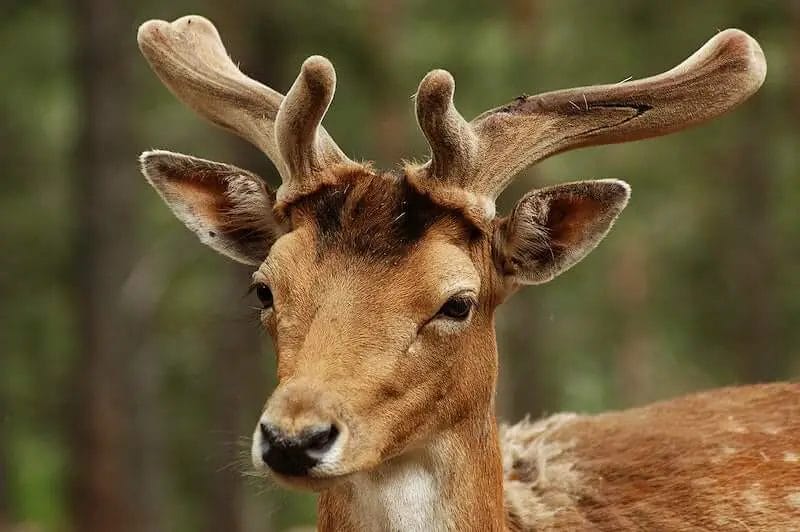“Blowing” is a term used to describe a specific type of behavior exhibited by deer. When a deer blows, it will make loud, explosive vocalizations through its nose and often stamp its feet or flare its nostrils.
This behavior serves multiple purposes for deer, including warning of danger or predators, asserting dominance or establishing territory, and communicating with other deer.

Why do deer blow at other animals?
One of the primary reasons deer blow at other animals is to warn of danger or predators. When a deer perceives a potential threat, it will often blow to alert other deer in the area.
This behavior is thought to help increase the chances of survival for the group by alerting them to potential danger and allowing them to take evasive action.
Deer may also blow at other animals to assert dominance or establish territory. This behavior is often seen during the breeding season, when bucks will engage in competitive behaviors such as antler rattling and blowing to establish dominance over other males.
Similarly, does may blow at other deer, particularly younger ones, to establish dominance within a group.
In addition to serving as a means of communication related to danger or social hierarchies, deer may also blow at other animals simply to communicate with one another.
This could be for a variety of reasons, such as to locate other members of the group, to coordinate movement, or to express various emotional states.
How do deer blow at other animals?
The physical act of blowing involves the deer making loud, explosive vocalizations through its nose and often stamping its feet or flaring its nostrils. This behavior is usually accompanied by other visual and auditory signals, such as flashing the whites of the eyes or lifting the tail.
There are different types of blowing behaviors that deer may exhibit, each with its own specific meaning.
For example, a short, sharp blow may be used to warn of danger, while a longer, more sustained blow may be used to assert dominance or establish territory. Similarly, a series of rapid blows may be used to communicate excitement or distress.

Do all deer blow at other animals?
Not all deer species exhibit blowing behavior to the same extent. Some species, such as white-tailed deer, are more prone to blowing than others.
Additionally, within a given species, there may be individual differences in the frequency and intensity of blowing behavior. Factors such as age, sex, and habitat can all influence a deer’s likelihood to blow.
For example, males are generally more likely to blow than females, and deer living in more open or densely populated areas may be more prone to blowing than those living in more isolated or less densely populated areas.
Conclusion
In conclusion, deer blowing is a behavior that serves multiple purposes for deer, including warning of danger or predators, asserting dominance or establishing territory, and communicating with other deer.
This behavior is exhibited through loud, explosive vocalizations and may be accompanied by other visual and auditory signals. The likelihood of a deer exhibiting blowing behavior can be influenced by factors such as species, age, sex, and habitat.
Understanding deer blowing behavior is important for the safety and well-being of both deer and humans.

Can deer blow at humans?
Yes, deer can blow at humans. While deer are generally timid and will try to avoid humans if possible, they may blow at humans as a means of warning or communication if they feel threatened or perceive the human as a potential danger.
This behavior is more likely to occur if the deer is cornered or feels that it has nowhere to flee.
Do all deer make the same sound when they blow?
No, not all deer make the same sound when they blow. The specific sound made by a deer when it blows can vary depending on the deer’s species, age, and size.
In general, larger deer tend to make louder and deeper sounds when they blow, while smaller deer may make higher-pitched or more subdued sounds.
Is it normal for a deer to blow at its own reflection?
Yes, it is not uncommon for a deer to blow at its own reflection, particularly if it is a male deer during the breeding season. When a male deer sees its own reflection, it may perceive it as a rival and engage in aggressive behaviors such as blowing and antler rattling.
This behavior is usually a display of dominance rather than a response to perceived danger.
Can deer blowing be a sign of illness or injury?
In some cases, deer blowing can be a sign of illness or injury. If a deer is in pain or discomfort, it may blow more frequently or more intensely than normal.
However, it is important to note that deer blowing can also occur for other reasons, such as warning of danger or communicating with other deer. It is not always possible to determine the specific cause of a deer’s blowing behavior without further observation or analysis.
Is it safe to approach a deer that is blowing?
It is generally not recommended to approach a deer that is blowing, as this behavior is often a sign of discomfort or aggression. If a deer feels threatened, it may become more aggressive or try to defend itself.
It is important to respect the deer’s space and give it plenty of room to move away if it wishes. If you are concerned about the deer’s well-being or suspect that it may be injured, it is best to contact a wildlife professional for assistance.
